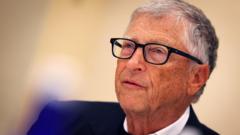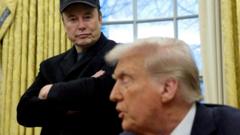Bill Gates announced plans to give away 99% of his immense fortune, committing to an accelerated philanthropic schedule via his foundation, which he intends to wind down by 2045. He emphasizes the responsibility of the wealthy to contribute to society, reflecting on the influence of historical figures like Andrew Carnegie.
Bill Gates Commits to Donate 99% of Wealth by 2045

Bill Gates Commits to Donate 99% of Wealth by 2045
The Microsoft co-founder accelerates his philanthropic efforts as he aims to leave a legacy focused on charitable giving rather than personal wealth.
In a recent blog post, Microsoft co-founder Bill Gates revealed his ambitious plan to donate nearly all of his wealth, aiming to give away 99% of his fortune over the next two decades. Gates stated that he wishes to ensure that no one can say he "died rich", and as part of that commitment, he plans to speed up his charitable contributions through the Bill & Melinda Gates Foundation, which he expects to conclude operations in 2045.
At 69 years old, Gates has already allocated approximately $100 billion to health and development initiatives through his foundation and anticipates distributing an additional $200 billion based on market conditions and inflation over the upcoming years. This renewed urgency in his philanthropic efforts comes in light of a 1889 essay by industrialist Andrew Carnegie titled "The Gospel of Wealth," which asserts that the wealthy bear a moral obligation to use their fortunes to benefit society.
While Gates's pledge is significant, it still positions him to retain substantial wealth post-donation, as his current net worth stands at $108 billion, making him one of the richest individuals globally. His blog featured a visual representation of his financial trajectory, showing a projected decline in wealth to nearly zero by 2045, along with his plan to utilize the foundation's endowment to realize his ambitious giving goals.
Inspired by fellow philanthropist Warren Buffett, Gates faces criticism regarding the Gates Foundation's influence on global health and claims that it enables him to circumvent tax responsibilities. However, Gates outlined three central goals for his organization: to eliminate preventable diseases affecting mothers and children, combat infectious diseases like malaria and measles, and eradicate poverty for millions.
In light of recent cuts to foreign aid budgets by the U.S., U.K., and France, Gates expressed concern about how these decisions impact the world's most vulnerable populations. He stressed the foundation's commitment to supporting efforts that help impoverished communities overcome their hardships.
In a pointed critique of Tesla CEO Elon Musk, Gates highlighted the detrimental effects of reduced foreign aid, accusing Musk of contributing to the suffering of children in need due to budget cuts. He cited specific instances, such as halted funding to a Mozambican hospital, which Musk later corrected, but insisted that real lives are at stake as a result of these financial decisions.
In summary, the Gates Foundation remains dedicated to supporting initiatives that empower impoverished communities, despite the challenges posed by shifting global aid dynamics and criticisms of its influence.



















